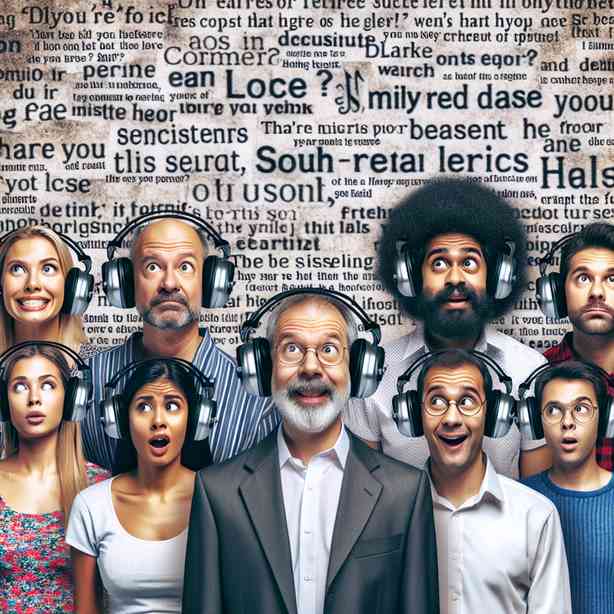
Misheard lyrics, often referred to as “mondegreens,” are a fascinating aspect of popular music culture. They occur when listeners misunderstand the lyrics of a song and interpret them differently than intended. This phenomenon has led to numerous humorous and often embarrassing misinterpretations of lyrics that many hold dear. The exploration of these misheard lyrics can reveal much about language, perception, and cultural context.
One of the most iconic examples is from the song “Purple Haze” by Jimi Hendrix. The line “Excuse me while I kiss the sky” is frequently misheard as “Excuse me while I kiss this guy.” This misinterpretation has not only entertained fans but has also inspired countless jokes and parodies. The confusion can stem from the similar sounds that words can produce, particularly when coupled with music’s rhythmic and melodic properties. As listeners sing along, they may focus more on the sound rather than the meaning, leading to such amusing misunderstandings.
Another prevalent example comes from the song “Blinded by the Light” by Bruce Springsteen, popularized by Manfred Mann’s Earth Band. The famous line “Revved up like a deuce” is often misheard as “Revved up like a douche.” This comedic twist on the lyric has become a classic misunderstanding and highlights how easily words can be misinterpreted when set to a catchy tune. This aligns with how collective memory works in music; as people share and laugh about these misconceptions, they can solidify those misheard lyrics as part of popular culture.
Continuing this trend, the song “Bad Moon Rising” by Creedence Clearwater Revival features the line “Don’t go around tonight, well, it’s bound to take your life.” Many listeners mishear it as “There’s a bad moon on the rise,” which completely changes the meaning yet remains in the realm of plausibility due to the similar phonetics. The way the human brain processes sound, particularly in musical contexts, allows for these slip-ups, making it a rich field for linguists and musicologists alike.
Moving on, the Beatles’ timeless classic “Lucy in the Sky with Diamonds” has drawn its share of misinterpretations. The phrase “the girl with kaleidoscope eyes” can easily bend to become “the girl with colitis goes by.” Such creative mishearings illustrate not just how words can form new images in listeners’ minds but also how humor and conversation evolve around these misunderstandings. Throughout history, these phrases become almost legendary, as fans share and revel in their incorrect assumptions, thus creating a community around the laughter and joy that music brings.
Furthermore, the song “I Will Always Love You” originally written by Dolly Parton and later popularized by Whitney Houston also showcases mishearing lyrics. The lyric “And I hope life treats you kind” has often been misinterpreted by fans as “And I hope you have a nice day.” This example highlights how certain emotional tones in music can lead listeners to take liberties with lyrics, essentially rewriting their own narrative within the song.
In investigating these misheard lyrics, it’s crucial to understand the factors contributing to such phenomena. For starters, the age and cultural background of listeners play significant roles. Often, younger generations who may not have grown up in the same musical milieu can interpret lyrics contrastingly from older listeners. Additionally, regional accents, dialects, and even the listening environment—be it a crowded bar or a quiet room—can affect how lyrics are perceived.
Moreover, the form of artistic expression that music embodies adds another layer. Genres such as rock, pop, and hip-hop frequently employ playful, abstract, or metaphorical language that can lend itself to various interpretations. This linguistic creativity invites listeners to engage with the song in personal ways, thus leading to instances of misheard lyrics that may resonate deeply, despite being incorrect.
Interestingly, the advent of technology and the internet has also transformed how these misheard lyrics are shared and discussed. Social media platforms are now rife with memes and humorous posts about the most popular misheard lyrics, allowing people to connect through shared experiences. As a result, songs previously riddled with misunderstandings have gained new life as these faux pas are celebrated rather than criticized.
Engagement with misheard lyrics can serve as a form of entertainment—a shared joke among listeners. For instance, an entire website dedicated to misheard lyrics titled “KissThisGuy” invites users to submit their funniest misinterpretations, contributing to a growing repository of musical mishaps. This form of community interaction not only fosters a sense of belonging among music fans but also promotes an appreciation for the craft of songwriting through its imperfect yet relatable moments.
As we navigate through the landscape of popular music, the role that misheard lyrics play in influencing listener experiences cannot be overlooked. They hold a mirror to our perceptions, biases, and shared cultural backgrounds. Whether through laughter, curiosity, or reinterpretation, misheard lyrics serve to deepen our connection with songs we love.
In conclusion, the exploration of misheard lyrics reveals a rich tapestry of language, humor, and cultural context, encouraging listeners to engage with music in new and entertaining ways. These faux pas, rather than detracting from the artistry of songwriting, enhance our appreciation for the creativity involved in crafting lyrics that resonate deeply with audiences. Music, after all, becomes a shared experience that transcends mere listening, allowing us to create lifelong memories around the sounds and stories that define our lives. So, the next time you hear a song, take a moment to consider the possibility of misheard lyrics and the joy they can bring, because in the world of music, even a small misunderstanding has the power to create lasting connections and laughter.


